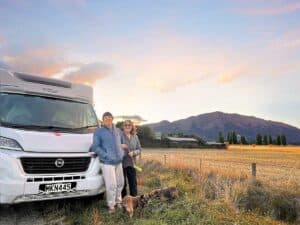One of the threats to personal safety in a motorhome or caravan is fire. Fortunately, it seems to be a rare event; even so, prevention is way better than cure. Here are a few tips to ensure that fire remains a minimal risk:
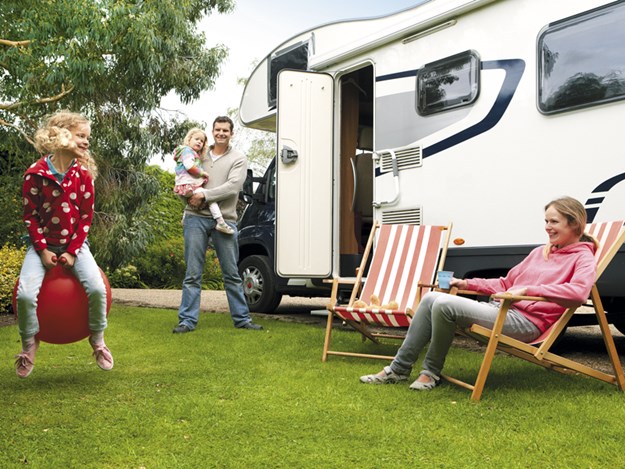 |
A few pre-travel safety checks means more time for family fun |
- Clean the stove grill and rangehood frequently to prevent a build-up of fats.
- Don’t leave cooking unattended, even for a minute.
- Don’t have curtains near the stove and watch where you put tea towels.
- Park at least three metres from your neighbour.
- Carry a smoke alarm. There are no special smoke alarms for RVs. Smoke alarms use either photoelectric or ionisation sensors to detect smoke. Some have both types of sensor. An ionisation detector is more effective in detecting flaming fires; photoelectric better discerns a smouldering fire. Mini versions are available if you need a mobile alarm to place in the awning or elsewhere.
- It is also a good idea to have a dedicated ‘snuffer’ on board. The New Zealand Fire Service recommends wet-chemical and ABE dry-powder extinguishers for motorhomes and caravans. Alternatively, have an ABE dry-powder extinguisher and a fire blanket. Learn how to use the equipment; there’s no time to read the instructions in the heat of the moment (pun intended). Aim the jet at the base of the fire, not the top, when using an extinguisher. Let’s hope you never have to.
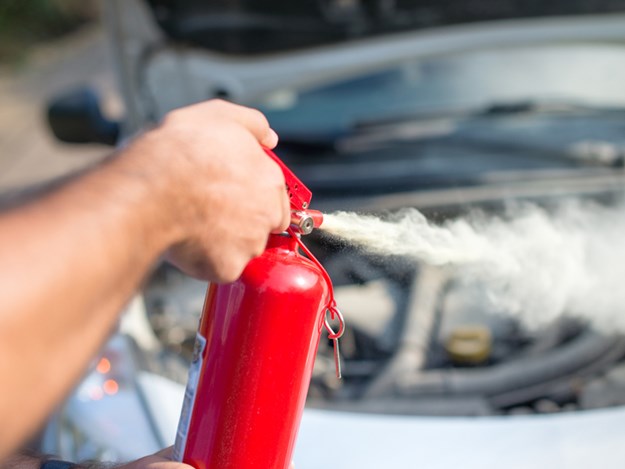 |
Keep a fire extinguisher on board |
Kitchen calamities
RV fires most often occur in kitchens. If the worst should happen, here is the procedure to follow:
- Don’t panic (easier said than done).
- Deprive the fire of oxygen. Use a pot lid, a cutting board, a dampened tea towel, fire blanket, or anything similar at hand. If you lift the snuffer, the fire will burst into life again.
- Turn off the source of heat if you can - at the stove or the gas bottle.
- Leave the pot/fry pan where it is. Attempt to remove it, and you could trip or drop it.
- Never throw water on an oil fire. The explosion is terrifying. If ever you wanted to fry in hell that is a simple way of going about it.
Detecting trouble
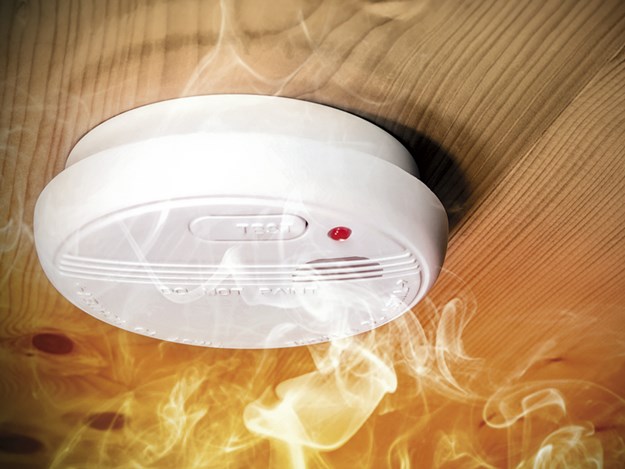 |
Smoke alarms are a must in your RV |
Detectors other than smoke alarms are also important.
- CO alarm: Highly toxic, carbon monoxide gas is undetectable without a device. It forms from the incomplete combustion of material containing carbon, such as LPG gas. The risk of exposure to carbon monoxide from portable devices is high in RVs and boats because of the small spaces. For that reason, it’s a good idea to ensure you have proper ventilation when cooking or heating with LPG. If the flame is yellow or partly yellow rather than blue, it indicates that the gas is not only burning inefficiently but will also be releasing CO. This could be an appliance problem or an incorrect ratio of LPG to oxygen and could be dangerous. There are several types of CO alarms, and their placement doesn’t matter as carbon monoxide spreads evenly.
- LPG: Sensors for LPG are not part of a standard fit-out, and it is up to the owner to ensure one is fitted. They are placed close to the floor as LPG is heavier than air. Dual-function LPG and CO sensors are also available. When travelling, always turn off the gas at the bottle. If you have an accident, the LPG connecting pipes can catch fire. It’s law that the LPG bottle locker be external from the habitation so that escaping gas cannot infiltrate the RV’s interior. The locker must have through ventilation.
Pre-drive checks
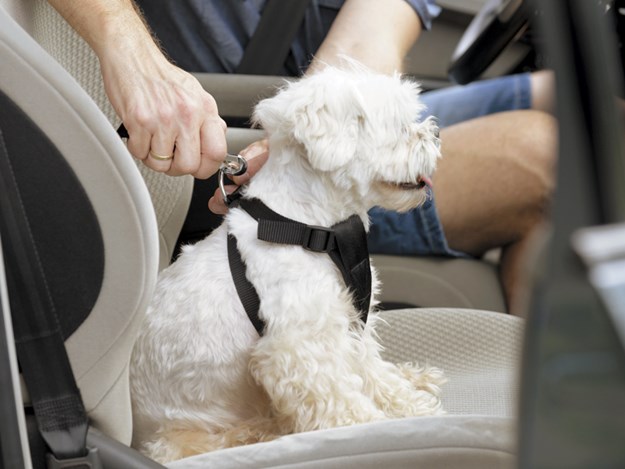 |
Pets should be safely restrained while travelling |
Every experienced RVer knows that setting off down the road without security checks is an invitation for disaster. Like a pilot before a flight, make a list and check it off before every trip. Don’t rely on your memory. Even if you do this religiously, mishaps can occur, and some of these can threaten your safety.
Something as innocuous as an untethered glass or a can of beans, for instance, can become a deadly missile if your motorhome stops quickly. This also applies to pets. It’s a nice idea to let your pet enjoy a sleep on the bed as you travel until you realise that a sudden stop could result with him spread-eagled on the windscreen.
The momentum of such missiles is forward, from the back end of the van to the front, so if you do have to leave anything loose, stow it up the front. Just as a cat can take flight, so can a person.
It is tempting when you detect a rattle while driving to have the passenger get up to locate the source. We’ve probably all done this at some stage, but it is a hazardous manoeuvre and not worth the risk should a sudden stop be needed.
Keeping in tow
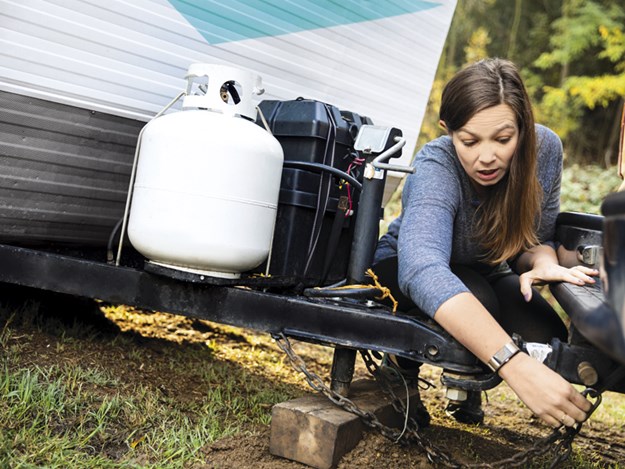 |
Either a break-away chain or cable is essential |
Pulling a caravan is not just a matter of tow and go; it is also essential to ‘know’. A caravan is a heavy weight on the rear of a towing vehicle and, if not managed properly, can interfere with the steering, braking and traction.
The way you load a caravan makes a difference to its towing stability. Ideally, heavy weights should be stored low down and over the axle. Make sure the caravan coupling and the tow-ball match in size and are in good condition.
Read up on the manufacturers’ recommended tow-ball weights for both your towing vehicle and the caravan. There are two tow-ball sizes in common use in New Zealand (50mms and 1 7/8 inches). It’s essential to fit a break-away cable or chain in case the coupling fails.
A break-away cable activates the caravan brakes, and a chain stops the caravan separating from the tow vehicle. Both are designed to prevent an uncoupled caravan sailing off down the road on its own.
Protecting your stuff
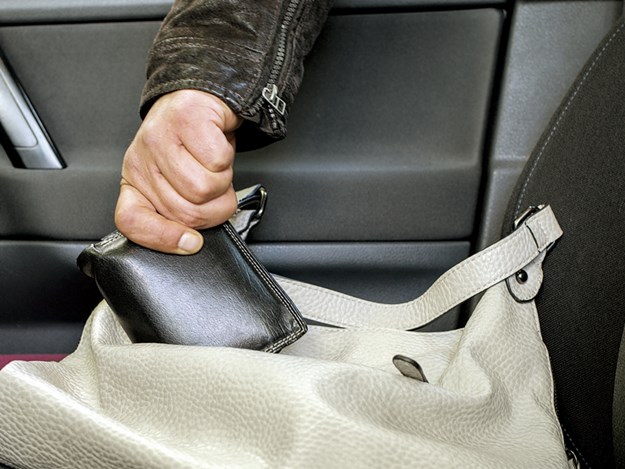 |
Don’t tempt opportunists. Keep your valuables out of sight |
By world standards, New Zealand is still a safe environment. Theft is relatively rare, personal assault even rarer, but if it happens, it can be life-changing. Prepare for the worst, knowing that it will probably never happen.
Don’t leave expensive items such as IT equipment where it can be seen. If you leave the RV, lock the cab and home doors even if you are away for a short time. It’s a good idea to pull down the shades or insect screens so that nosey-parkers can’t case the joint. Have a hiding place for credit cards and cash.
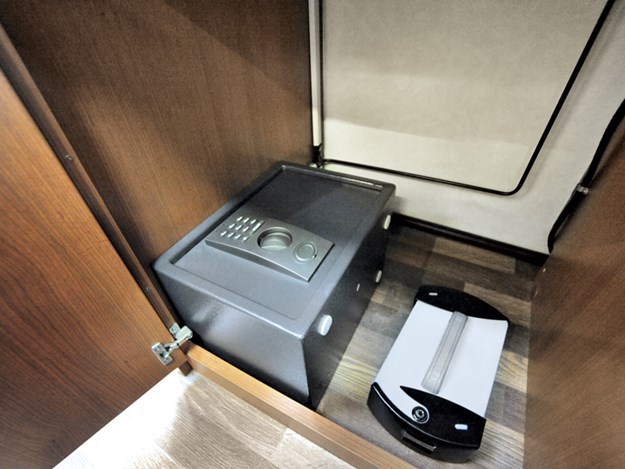 |
Keep valuables in a lock box |
Some RVs have built-in safety boxes for this purpose. Just in case, write down the serial numbers of anything valuable. In some parts of the country, equipment left out at night can be tempting for light-fingered locals.
Play it safe and put chairs, fishing rods and barbecues away if you think there is any chance of them taking a night walk. It can be a good idea to have an interior sensor alarm if you intend to leave your RV for long periods.
Stranger danger
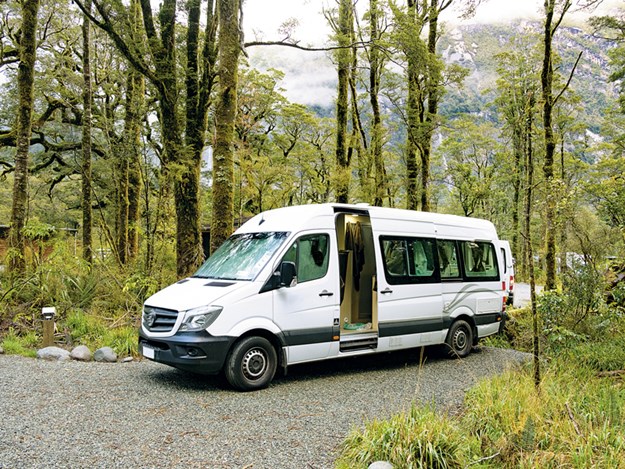 |
It’s a good idea to park so that you can drive out quickly and easily if needed |
Losing your stuff is one thing: the thought of losing life and limb is more unnerving. There’s safety in numbers, so, in more isolated areas, it is better to park with at least one other caravan or motorhome.
Park your motorhome so that you can make a quick getaway without having to back or turn if there is any reason to do so. Be aware of your surroundings and move on if anything makes you feel uneasy.
Another tip is to make sure your cell phone is charged, and that you have checked there is a signal. Know what numbers to ring in an emergency. When off-grid, some people carry devices that don’t need to be charged but can still raise the alarm, such as fog horns, whistles or personal security alarms.
Security whistles are made for emergencies and are higher-pitched than standard whistles. They are cheaper than a personal security alarm, but the difference is that a security alarm keeps screaming when you stop blowing, and a whistle doesn’t.


